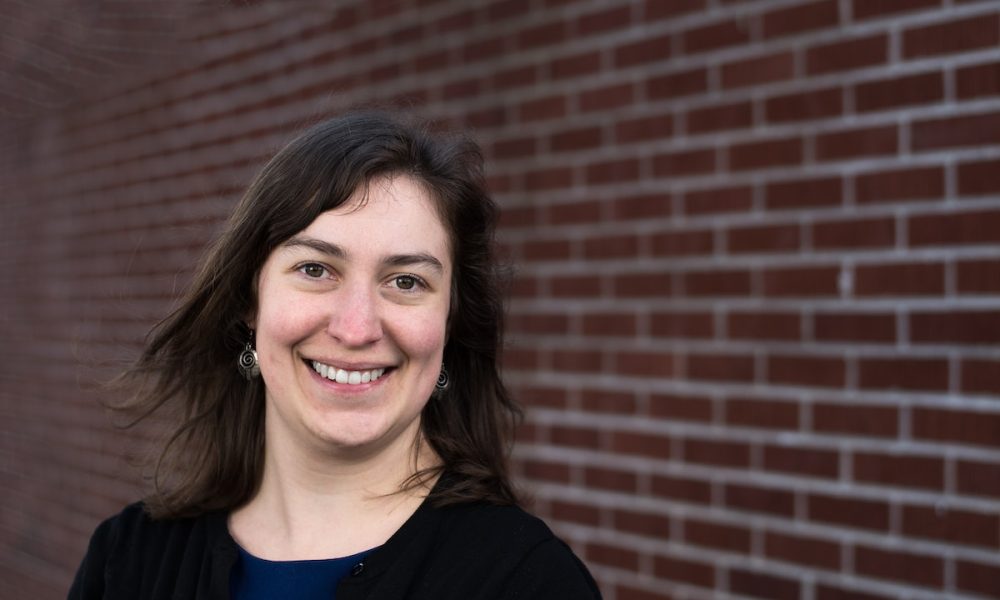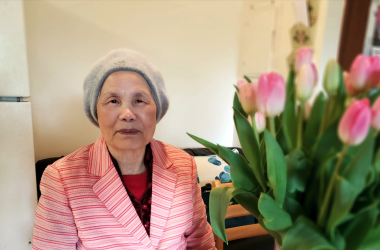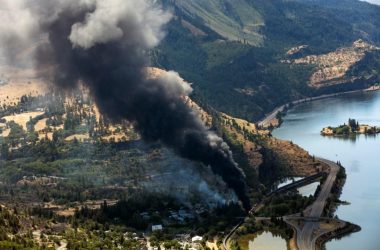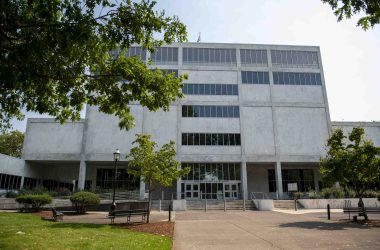
Rachel Alexander, reporter at Salem Reporter. (Fred Joe/Special to Salem Reporter)
The past year has been something of a whirlwind – moving to a new state, starting a new job and getting to know a new community as a reporter.
Salem Reporter has been one of the most fun and most challenging things I’ve taken on in my career, and it’s incredible to look back and see how much we’ve grown from our first day in the office, when we were each presented with an empty desk, a computer and a stapler.
I’ve got an ambitious list of stories I want to tackle this year, shedding light on challenges and accomplishments in local schools and issues like affordable housing. I hope you’ll keep reading.
Here’s a look back at what I consider my most important work during our first year – plus a few favorites.
And here are what I consider my five most important stories:
To improve teacher diversity, Salem-Keizer focusing on training its own students, classroom aides
In my first month on the job for Salem Reporter, I went to a seminar through the Education Writers Association, where I got a firehose of information about teaching and current issues facing schools across the U.S. Teacher diversity was a big theme – and many presenters showed us clear data that for black and Latino kids, having just one teacher who looks like them at some point in school really matters for things like graduating and test scores.
I came back to Salem with a goal of writing a local story around that issue and learning what’s being done here to get more Latino teachers in the classroom. My hope was also to illustrate why this issue matters with both research and local experiences – it’s not simply a matter of filling a quota for the sake of filling a quota.
Salem-Keizer teachers face repeated injuries at the hands of students, documents show
Last year, I talked to dozens of teachers, classroom assistants, counselors, behavior specialists and other school staff at school board meetings, rallies and in the classroom. Student behavior was something many brought up, and it was clear some in-depth reporting on the issue was needed.
Many employees told me about being injured by their own students – something which shocked me at the time, though I’ve since realized it’s relatively common. That was my starting point for reporting and led to a data-driven story about how frequently these injuries happen, and what it looks like for staff facing them. I later followed up with a piece about a state investigation into repeated injuries in one classroom.
It’s an issue I plan to keep covering this year.
NINE INTO SIX: Salem Reporter’s 5-part series on challenges of local schools
If I’d known how much work this project would be when I started it, I probably would have given up. But I’m glad I didn’t, because this in-the-classroom look at how local schools are working to improve student learning in the face of significant social and educational challenges is one of the most important things I’ve written.
We envisioned this series as a way to get beyond test scores and show what the numbers and data education administrators track so closely looks like in practice. How do schools tasked with teaching hundreds of kids who may not have clean clothes, electricity or a parent who can help with homework teach students to read? And what accounts for why some do better than others?
After listening to a divided public, Salem-Keizer school board approves boundary changes
The issue of new school boundaries was one of the most divisive for Salem-Keizer administrators and the school board last year. This brought to the surface concerns about school segregation, equity, overcrowding and a host of other issues.
I worked to follow the process from the beginning, tracking small changes to the proposal and speaking to parents in some of the most impacted areas in southeast Salem. This final story was an effort to get beyond the vote tally on the school board and capture what was at stake for the many families, students, teachers and others who spoke passionately about their concerns.
School board members try to pull together in face of major issues for Salem-Keizer schools
I didn’t become a journalist to cover politics. I love writing about issues and the human impacts of policy, but covering political campaigns and the personalities behind them is not my cup of tea. So when my editor dropped this assignment in my lap, I knew it would be a good challenge.
I worked over the course of a very busy week to interview every school board member, their predecessors, community leaders and district staff to produce a comprehensive portrait of a new school board: their hopes, their challenges and their personalities. Nearly everyone who reached out to me after told me they learned something, and I’m heading into a new school year with a much more solid grounding of what I need to pay attention to.
And here are a few favorite stories:
IKE Box now staying put as YMCA, Salem First Presbyterian consider land sales
The first time I walked into Ike Box and saw the funeral chapel paintings on the walls, I thought, “What on earth is this?” But like many Salemites, it only took a few cups of coffee to win me over.
The past year was one of moving pieces for Ike Box and the YMCA as YMCA leaders began a demolition and construction project, and Ike Box pondered its future: Demolish the building? Move it across the street?
My job isn’t to be a cheerleader, and I’ve spent a lot of time this year asking about funding plans and looking over tax returns for both nonprofits. But it’s clear a lot of people in Salem value both institutions, and I’ve enjoyed being able to let people know what’s happening.
Oregon prisons ban dozens of technology and programming books over security concerns
I’ve always been fascinated by prison rules and policies. Prisons and jails are a rare place in the U.S. where the state has total control over people’s day-to-day lives, and the regulations that come out of that shed a fascinating light on so many issues – values, security concerns and more.
As reporters, one of our jobs is to defend free speech and challenge censorship, and most of us take a dim view of things like book bans (though we recognize an instructional manual on making shanks probably doesn’t belong in a prison). I requested this list out of curiosity and was surprised to see so many technology-related books banned from Oregon facilities. This story got some national attention and taught me more about how Oregon prisons review books for inmates.
McKay senior graduating on time despite starting senior year with half the credits needed
I love a good watchdog story, but some balance is always nice. As graduation approached in the spring, I suggested we highlight a local graduate from each high school and reached out to principals and students for suggestions.
KJ Kovac’s story was one of the more incredible ones I’ve heard, though getting him to talk through his shyness was a challenge. But my favorite part of this story was seeing how far it traveled.
Our Facebook post got hundreds of shares, mostly from Islanders here in Salem and in the Pacific. A reporter from Guam even emailed me to thank me for writing it. It was awesome to be part of so many people recognizing a hardworking high school student.
Yellow bracelets and blue mats: an evening at a Salem warming center
By February of this year, we’d written several stories about the need for volunteers at Salem warming centers: local churches that open their doors to homeless people on cold winter nights. I thought showing people what takes place at the warming centers might be more helpful, both in terms of giving prospective volunteers an idea of what to expect and documenting the broad swath of people who seek shelter.
This story came in the middle of me working on a challenging project that was causing me a lot of stress, and reporting from the warming center ended up being a perfect antidote. For a few hours, I got to interact with volunteers and guests, take photos and generally just get out of my own head. I ended up coming back later that week to volunteer myself and making some friends and connections that have persisted to this day.
A day in the life of a Salem-Keizer school bus driver
One of the best parts of my job is following my curiosities. As a kid, I never gave much thought to the person driving my school bus, except when I got yelled at for playing cards with my friends too loudly. But as an adult, I’ve sometimes wondered what their days are like.
Getting up at 5 a.m. to meet driver Alan Booth at the south bus lot was not my favorite part of reporting, but seeing the many pieces that go into getting kids to school safely helped me better understand our local schools – and reminded me of my own days riding the bus.
Rachel Alexander covers education and nonprofits for Salem Reporter. She came to Salem from the Spokesman-Review in Spokane, Washington, where she covered health care and social services. Contact: [email protected] or 503-575-1241.
RELATED COMMENTARIES:
On Salem Reporter’s anniversary, thoughts of more local news coverage to come
After a year in Salem, reporter’s faith in the power of journalism is revived
Getting story behind the story provides strong journalism for Salem

Rachel Alexander is Salem Reporter’s managing editor. She joined Salem Reporter when it was founded in 2018 and covers city news, education, nonprofits and a little bit of everything else. She’s been a journalist in Oregon and Washington for a decade. Outside of work, she’s a skater and board member with Salem’s Cherry City Roller Derby and can often be found with her nose buried in a book.









